Opinion: People want advice on land-based salmon farming projects. Here's what I tell them.
'It is a good thing to be a realist now,' recirculating aquaculture expert tells IntraFish.

'It is a good thing to be a realist now,' recirculating aquaculture expert tells IntraFish.
